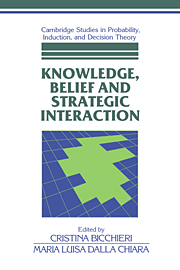Book contents
- Frontmatter
- Contents
- Preface
- List of contributors
- 1 Feasibility
- 2 Elicitation for games
- 3 Equilibrium, common knowledge, and optimal sequential decisions
- 4 Rational choice in the context of ideal games
- 5 Hyperrational games: Concept and resolutions
- 6 Equilibria and the dynamics of rational deliberation
- 7 Tortuous labyrinth: Noncooperative normal-form games between hyperrational players
- 8 On consistency properties of some strongly implementable social choice rules with endogenous agenda formation
- 9 Algorithmic knowledge and game theory
- 10 Possible worlds, counterfactuals, and epistemic operators
- 11 Semantical aspects of quantified modal logic
- 12 Epistemic logic and game theory
- 13 Abstract notions of simultaneous equilibrium and their uses
- 14 Representing facts
- 15 Introduction to metamoral
- 16 The logic of Ulam's games with lies
- 17 The acquisition of common knowledge
- 18 The electronic mail game: Strategic behavior under “almost common knowledge”
- 19 Knowledge-dependent games: Backward induction
- 20 Common knowledge and games with perfect information
- 21 Game solutions and the normal form
- 22 The dynamics of belief systems: Foundations versus coherence theories
- 23 Counterfactuals and a theory of equilibrium in games
19 - Knowledge-dependent games: Backward induction
Published online by Cambridge University Press: 05 November 2011
- Frontmatter
- Contents
- Preface
- List of contributors
- 1 Feasibility
- 2 Elicitation for games
- 3 Equilibrium, common knowledge, and optimal sequential decisions
- 4 Rational choice in the context of ideal games
- 5 Hyperrational games: Concept and resolutions
- 6 Equilibria and the dynamics of rational deliberation
- 7 Tortuous labyrinth: Noncooperative normal-form games between hyperrational players
- 8 On consistency properties of some strongly implementable social choice rules with endogenous agenda formation
- 9 Algorithmic knowledge and game theory
- 10 Possible worlds, counterfactuals, and epistemic operators
- 11 Semantical aspects of quantified modal logic
- 12 Epistemic logic and game theory
- 13 Abstract notions of simultaneous equilibrium and their uses
- 14 Representing facts
- 15 Introduction to metamoral
- 16 The logic of Ulam's games with lies
- 17 The acquisition of common knowledge
- 18 The electronic mail game: Strategic behavior under “almost common knowledge”
- 19 Knowledge-dependent games: Backward induction
- 20 Common knowledge and games with perfect information
- 21 Game solutions and the normal form
- 22 The dynamics of belief systems: Foundations versus coherence theories
- 23 Counterfactuals and a theory of equilibrium in games
Summary
INFORMATION AND META-INFORMATION
Although notions of rationality have been extensively discussed in game theory, the epistemic conditions under which a game is played – though implicitly presumed – have seldom been explicitly analyzed and formalized. These conditions include the players' reasoning processes and capabilities, as well as their knowledge of the game situation. Some aspects of information about chance moves and other players' moves are represented by information partitions in extensive-form games. But a player's knowledge of the structure of information partitions themselves is different from his information about chance moves and other players' moves. The informational aspects captured by the extensive form have nothing to do with a player's knowledge of the structure of the game.
A common epistemic presumption is that the structure of the game is common knowledge among the players. By “common knowledge of p” is meant that p is not just known by all the players in a game, but is also known to be known, known to be known to be known, … ad infinitum. The very idea of a Nash equilibrium is grounded on the assumptions that players have common knowledge of the structure of the game and of their respective priors. These assumptions, however, are always made outside the theory of the game, in that the formal description of the game does not include them.
- Type
- Chapter
- Information
- Knowledge, Belief, and Strategic Interaction , pp. 327 - 344Publisher: Cambridge University PressPrint publication year: 1992
- 4
- Cited by



